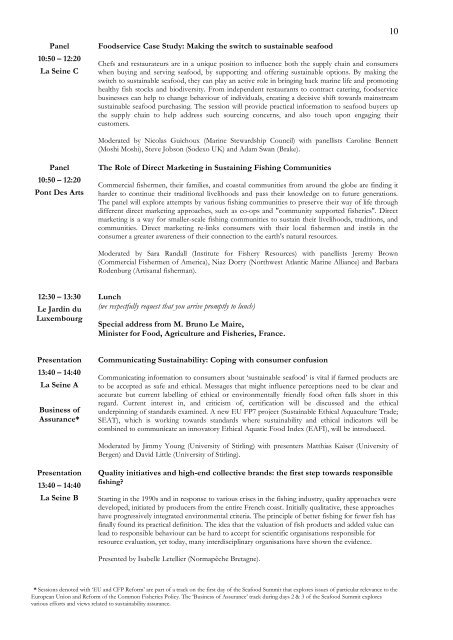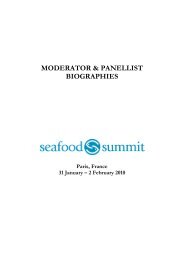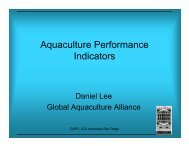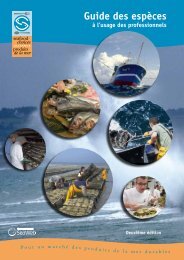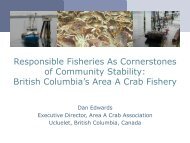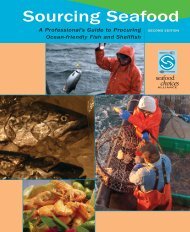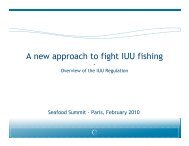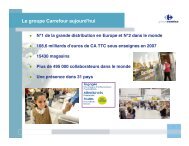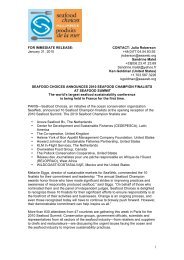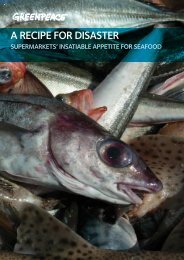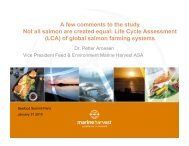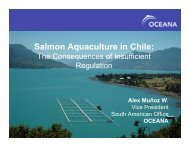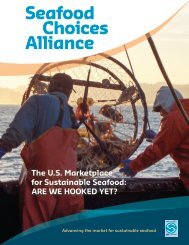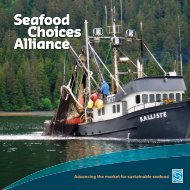Paris and Seafood Summit 2010! - Seafood Choices Alliance
Paris and Seafood Summit 2010! - Seafood Choices Alliance
Paris and Seafood Summit 2010! - Seafood Choices Alliance
Create successful ePaper yourself
Turn your PDF publications into a flip-book with our unique Google optimized e-Paper software.
10<br />
Panel<br />
10:50 – 12:20<br />
La Seine C<br />
Foodservice Case Study: Making the switch to sustainable seafood<br />
Chefs <strong>and</strong> restaurateurs are in a unique position to influence both the supply chain <strong>and</strong> consumers<br />
when buying <strong>and</strong> serving seafood, by supporting <strong>and</strong> offering sustainable options. By making the<br />
switch to sustainable seafood, they can play an active role in bringing back marine life <strong>and</strong> promoting<br />
healthy fish stocks <strong>and</strong> biodiversity. From independent restaurants to contract catering, foodservice<br />
businesses can help to change behaviour of individuals, creating a decisive shift towards mainstream<br />
sustainable seafood purchasing. The session will provide practical information to seafood buyers up<br />
the supply chain to help address such sourcing concerns, <strong>and</strong> also touch upon engaging their<br />
customers.<br />
Moderated by Nicolas Guichoux (Marine Stewardship Council) with panellists Caroline Bennett<br />
(Moshi Moshi), Steve Jobson (Sodexo UK) <strong>and</strong> Adam Swan (Brake).<br />
Panel<br />
10:50 – 12:20<br />
Pont Des Arts<br />
The Role of Direct Marketing in Sustaining Fishing Communities<br />
Commercial fishermen, their families, <strong>and</strong> coastal communities from around the globe are finding it<br />
harder to continue their traditional livelihoods <strong>and</strong> pass their knowledge on to future generations.<br />
The panel will explore attempts by various fishing communities to preserve their way of life through<br />
different direct marketing approaches, such as co-ops <strong>and</strong> "community supported fisheries". Direct<br />
marketing is a way for smaller-scale fishing communities to sustain their livelihoods, traditions, <strong>and</strong><br />
communities. Direct marketing re-links consumers with their local fishermen <strong>and</strong> instils in the<br />
consumer a greater awareness of their connection to the earth's natural resources.<br />
Moderated by Sara R<strong>and</strong>all (Institute for Fishery Resources) with panellists Jeremy Brown<br />
(Commercial Fishermen of America), Niaz Dorry (Northwest Atlantic Marine <strong>Alliance</strong>) <strong>and</strong> Barbara<br />
Rodenburg (Artisanal fisherman).<br />
12:30 – 13:30<br />
Le Jardin du<br />
Luxembourg<br />
Lunch<br />
(we respectfully request that you arrive promptly to lunch)<br />
Special address from M. Bruno Le Maire,<br />
Minister for Food, Agriculture <strong>and</strong> Fisheries, France.<br />
Presentation<br />
13:40 – 14:40<br />
La Seine A<br />
Business of<br />
Assurance*<br />
Communicating Sustainability: Coping with consumer confusion<br />
Communicating information to consumers about ‘sustainable seafood’ is vital if farmed products are<br />
to be accepted as safe <strong>and</strong> ethical. Messages that might influence perceptions need to be clear <strong>and</strong><br />
accurate but current labelling of ethical or environmentally friendly food often falls short in this<br />
regard. Current interest in, <strong>and</strong> criticism of, certification will be discussed <strong>and</strong> the ethical<br />
underpinning of st<strong>and</strong>ards examined. A new EU FP7 project (Sustainable Ethical Aquaculture Trade;<br />
SEAT), which is working towards st<strong>and</strong>ards where sustainability <strong>and</strong> ethical indicators will be<br />
combined to communicate an innovatory Ethical Aquatic Food Index (EAFI), will be introduced.<br />
Moderated by Jimmy Young (University of Stirling) with presenters Matthias Kaiser (University of<br />
Bergen) <strong>and</strong> David Little (University of Stirling).<br />
Presentation<br />
13:40 – 14:40<br />
La Seine B<br />
Quality initiatives <strong>and</strong> high-end collective br<strong>and</strong>s: the first step towards responsible<br />
fishing?<br />
Starting in the 1990s <strong>and</strong> in response to various crises in the fishing industry, quality approaches were<br />
developed, initiated by producers from the entire French coast. Initially qualitative, these approaches<br />
have progressively integrated environmental criteria. The principle of better fishing for fewer fish has<br />
finally found its practical definition. The idea that the valuation of fish products <strong>and</strong> added value can<br />
lead to responsible behaviour can be hard to accept for scientific organisations responsible for<br />
resource evaluation, yet today, many interdisciplinary organisations have shown the evidence.<br />
Presented by Isabelle Letellier (Normapêche Bretagne).<br />
* Sessions denoted with ‘EU <strong>and</strong> CFP Reform’ are part of a track on the first day of the <strong>Seafood</strong> <strong>Summit</strong> that explores issues of particular relevance to the<br />
European Union <strong>and</strong> Reform of the Common Fisheries Policy. The ‘Business of Assurance’ track during days 2 & 3 of the <strong>Seafood</strong> <strong>Summit</strong> explores<br />
various efforts <strong>and</strong> views related to sustainability assurance.


